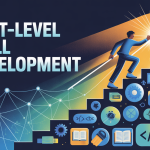
Leadership: The Capacity to Inspire and Lead Others
Leadership is a vital skill that transcends job titles and positions of authority. It is the capacity to inspire, guide, and influence others towards achieving common goals.
Effective leadership is valuable not only for those in management positions but also for anyone in mentorship or collaborative roles.
This comprehensive article explores the various facets of leadership, its importance in different contexts, and strategies to develop and enhance leadership skills.
Understanding Leadership
Leadership is often defined as the ability to influence and guide individuals or groups towards achieving specific objectives.
It involves setting a vision, motivating others, and fostering an environment of collaboration and trust.
True leadership is not confined to those with formal authority; it can emerge from any level within an organization or community.
The Importance of Leadership
1. Driving Organizational Success
Effective leadership is crucial for the success of any organization. Leaders set the direction and tone, making strategic decisions that shape the future.
They inspire their teams to perform at their best, fostering a culture of excellence and innovation.
2. Enhancing Team Performance
Leaders play a key role in enhancing team performance by providing clear goals, constructive feedback, and continuous support.
They create a positive work environment where team members feel valued and motivated.
3. Building Trust and Collaboration
Trust and collaboration are the bedrock of any successful team or organization. Leaders build trust by being transparent, consistent, and fair.
They encourage collaboration by promoting open communication, recognizing diverse perspectives, and facilitating teamwork.
4. Navigating Change
In today’s fast-paced world, change is constant.
Effective leaders help their teams navigate through change by providing clear direction, managing uncertainties, and maintaining morale.
They are adaptable and resilient, guiding their teams through transitions with confidence.
Leadership in Different Contexts
Leadership manifests differently across various contexts.
While the core principles remain the same, the application of leadership skills can vary based on the environment and the specific challenges faced.
1. Leadership in Management
Managers are typically responsible for overseeing teams, projects, or departments.
Effective managerial leadership involves setting clear objectives, delegating tasks, and monitoring performance.
Managers must balance operational efficiency with strategic planning, ensuring that their teams meet short-term goals while working towards long-term vision.
2. Leadership in Mentorship
Mentors provide guidance and support to less experienced individuals.
Effective mentorship involves sharing knowledge, offering constructive feedback, and serving as a role model.
Mentors help mentees navigate their career paths, develop new skills, and build confidence.
3. Leadership in Collaborative Roles
In collaborative roles, leadership is about fostering a cooperative environment where all members contribute to achieving common goals.
Collaborative leaders facilitate open communication, mediate conflicts, and ensure that all voices are heard.
They leverage the collective expertise of the group to drive success.
Key Leadership Qualities
Effective leaders exhibit a range of qualities that enable them to inspire and guide others. Some of the key qualities include:
1. Vision
A clear vision provides direction and purpose. Leaders with a strong vision can articulate their goals and inspire others to work towards them.
They are forward-thinking, anticipating future trends and opportunities.
2. Empathy
Empathy involves understanding and sharing the feelings of others.
Empathetic leaders build strong relationships with their team members, fostering a supportive and inclusive environment.
They are attuned to the needs and concerns of others, which helps them address issues effectively.
3. Integrity
Integrity is the quality of being honest and having strong moral principles. Leaders with integrity are trustworthy and reliable.
They lead by example, demonstrating ethical behavior and consistency in their actions.
4. Communication
Effective communication is crucial for leadership. Leaders must be able to convey their vision, expectations, and feedback clearly.
Good communication also involves active listening, ensuring that leaders understand the perspectives and concerns of their team members.
5. Resilience
Resilience is the ability to recover from setbacks and remain focused on goals.
Resilient leaders maintain their composure under pressure and inspire their teams to persevere through challenges.
They view obstacles as opportunities for growth and learning.
6. Adaptability
In a rapidly changing world, adaptability is essential. Leaders who are adaptable can pivot strategies in response to new information and changing circumstances.
They are open to new ideas and willing to take calculated risks.
Developing Leadership Skills
Leadership skills can be developed and enhanced through intentional practice and self-awareness. Here are some strategies to cultivate effective leadership:
1. Continuous Learning
Commit to lifelong learning by seeking out new knowledge and experiences.
Attend workshops, read books, and engage in professional development opportunities. Learning from diverse sources can provide new perspectives and ideas.
2. Seek Feedback
Actively seek feedback from peers, mentors, and team members. Constructive feedback provides valuable insights into your strengths and areas for improvement.
Use this feedback to refine your leadership approach.
3. Build Self-Awareness
Self-awareness involves understanding your own strengths, weaknesses, and values.
Reflect on your experiences and behaviors to gain insights into your leadership style. Self-awareness enables you to lead authentically and effectively.
4. Practice Emotional Intelligence
Emotional intelligence (EI) is the ability to recognize, understand, and manage your own emotions and the emotions of others.
Developing EI involves improving self-regulation, empathy, and social skills. High EI leaders can navigate interpersonal relationships with sensitivity and insight.
5. Develop Decision-Making Skills
Effective leaders make informed and timely decisions.
Enhance your decision-making skills by gathering relevant information, considering multiple perspectives, and evaluating potential outcomes.
Learn to balance analytical thinking with intuition.
6. Foster a Growth Mindset
Adopt a growth mindset, which is the belief that abilities and intelligence can be developed through effort and learning.
Encourage yourself and your team to embrace challenges, learn from failures, and strive for continuous improvement.
Real-World Examples of Effective Leadership
1. Satya Nadella, CEO of Microsoft
Satya Nadella transformed Microsoft by fostering a culture of innovation and collaboration.
His empathetic leadership style and focus on continuous learning have driven the company’s success in the rapidly evolving tech industry.
2. Jacinda Ardern, Prime Minister of New Zealand
Jacinda Ardern’s leadership during crises, such as the Christchurch mosque shootings and the COVID-19 pandemic, has been characterized by empathy, transparency, and decisiveness.
Her ability to communicate effectively and build trust has earned her global recognition.
3. Oprah Winfrey, Media Mogul
Oprah Winfrey’s leadership extends beyond her media empire.
As a mentor and philanthropist, she has inspired countless individuals through her authenticity, resilience, and commitment to positive change.
Leadership is a multifaceted skill that is essential in various contexts, from management and mentorship to collaborative roles.
The ability to inspire and guide others is not confined to those with formal authority; it can be cultivated and practiced by anyone.
By developing key qualities such as vision, empathy, integrity, and adaptability, and by engaging in continuous learning and self-awareness, individuals can enhance their leadership capabilities.
Effective leadership drives organizational success, enhances team performance, builds trust and collaboration, and navigates change.
Embracing the principles and practices of leadership will not only benefit individual leaders but also create a positive and dynamic environment for everyone involved.
Go To 10 Most Important Skills Main


